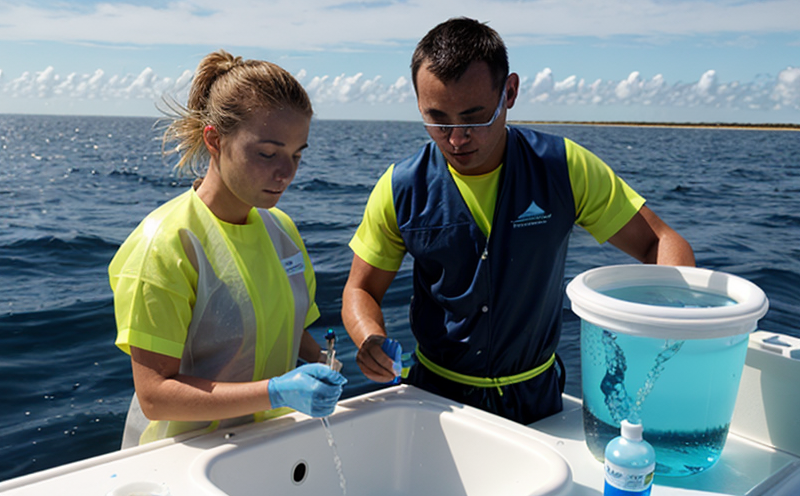ASTM D7066 Fluorometric Oil in Water Test in Seawater
The ASTM D7066 test method is specifically designed for the measurement of oil and grease in seawater using a fluorometric technique. This service ensures accurate quantification, which is crucial for monitoring environmental impacts from petroleum hydrocarbon pollution. The process involves sample collection at specified locations and depths to ensure representative data.
Our laboratory adheres strictly to ASTM D7066 guidelines, employing advanced instrumentation such as fluorescence detectors that provide high sensitivity and specificity in detecting oil contamination. Preparing samples for testing requires thorough filtration and dilution steps to optimize the detection range of the fluorometric method. Proper preparation ensures accurate results, which are essential for compliance with environmental regulations.
ASTM D7066 is widely used by regulatory bodies and industries involved in monitoring oil spills and their cleanup efforts. It allows stakeholders to track the effectiveness of remediation strategies over time. Compliance officers can use these data points to ensure that operations meet international standards set by ISO 14001 and other environmental protocols.
R&D engineers benefit from this service by gaining insights into long-term impacts on marine ecosystems, helping them develop more effective mitigation techniques. Quality managers rely on this testing when auditing suppliers or assessing internal processes for potential oil contamination risks. For procurement teams, it offers a transparent view of the quality assurance measures implemented by suppliers.
The fluorometric technique in ASTM D7066 has several advantages over traditional gravimetric methods. It provides faster results with higher precision and lower detection limits. This makes it particularly suitable for real-time monitoring during spills or other environmental incidents where rapid decision-making is essential.
| Application | Description |
|---|---|
| Evaluation of Oil Spills | Monitoring the extent and impact of oil spills on marine environments. |
| Maintenance of Water Quality Standards | Ensuring compliance with environmental regulations regarding hydrocarbon levels in seawater. |
| Post-Remediation Verification | Verifying the effectiveness of remedial actions taken after oil contamination events. |
The test method is particularly sensitive to low concentrations, making it ideal for detecting even minute traces of hydrocarbons in seawater. This sensitivity translates into better management practices and more accurate assessments of environmental health.
Our laboratory uses state-of-the-art equipment including fluorescence spectrometers that adhere strictly to ASTM D7066 specifications. These instruments ensure consistent and reliable results, which are critical for maintaining credibility within the industry. By partnering with us, clients can trust in unbiased data that supports informed decision-making processes.
We also offer comprehensive reporting services tailored to each client's needs, providing detailed analyses along with interpretations of findings based on current environmental guidelines. Our team comprises experts who stay updated on all relevant standards like ISO 14001 and IEC 62387, ensuring compliance throughout every phase of the testing process.
For those seeking to understand how ASTM D7066 impacts their operations or projects involving seawater analysis, our services provide valuable insights. Whether it's for regulatory compliance purposes or internal quality assurance initiatives, this service plays a pivotal role in safeguarding marine ecosystems from harmful pollutants.
Industry Applications
- Evaluation of Oil Spills: Monitoring the extent and impact of oil spills on marine environments.
- Maintenance of Water Quality Standards: Ensuring compliance with environmental regulations regarding hydrocarbon levels in seawater.
- Post-Remediation Verification: Verifying the effectiveness of remedial actions taken after oil contamination events.
Eurolab Advantages
Our laboratory offers a range of advantages when it comes to ASTM D7066 testing for oil in seawater. Firstly, we employ highly qualified technicians who have extensive experience in this field. Their expertise ensures accurate sample preparation and interpretation of results.
We also utilize cutting-edge technology that meets or exceeds the requirements outlined by ASTM D7066. Our instruments are regularly calibrated to maintain precision and accuracy throughout each test run. Additionally, our team stays current with industry trends through continuous training programs and participation in relevant conferences.
Client satisfaction is at the forefront of everything we do. We offer flexible scheduling options that accommodate busy workloads while ensuring timely delivery of reports. Furthermore, our competitive pricing structure makes this service accessible to a wide range of clients without compromising on quality.
International Acceptance and Recognition
- ASTM D7066 is recognized by ISO as an international standard for oil-in-water testing in seawater.
- The test method is widely accepted by regulatory bodies including the EPA, ECHA, and others around the world.
- Many industries rely on ASTM D7066 results to ensure compliance with environmental regulations globally.





